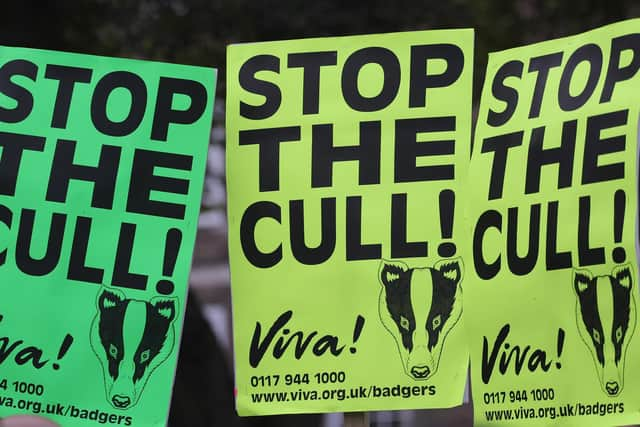Badger welfare group in Northamptonshire calls for different approach over applications to cull the protected species
and live on Freeview channel 276
A badger welfare group from Northamptonshire is calling for a different approach over fresh applications to cull the protected species in efforts to curb the spread of bovine Tuberculosis (BTB) in cattle.
Northamptonshire Badger Group (NBG), which has previously criticised the practice, has raised concerns again after a group supposedly run by farmers living in the Brackley and Towcester areas, reportedly applied for the second year in a row for a licence to cull the animals.
Advertisement
Hide AdAdvertisement
Hide AdIf issued by Natural England, the government body that regulates such practices, "thousands" of badgers could be killed in an effort to stop them spreading the disease to farmers' cattle. BTB is known to kill the animals it infects and can, in rare cases, be passed on to humans.


However activists have claimed that badgers are merely a "spillover host" for the disease, with the vast majority of infectious hosts being found amongst the cows themselves.
A spokesperson from the group said: "The Government policy of culling badgers to control bovine TB in cattle is highly controversial on scientific grounds, with badgers identified as a significant source for the ongoing spread in cattle, despite there being good, independent scientific evidence that cattle to cattle transmission is the major transmission route for disease.
"Cattle live in close proximity to each other, many inside for large parts of their lives and cattle excrement and slurry which is routinely spread over farms has shown to have the bacteria living in it for six months or more.
Advertisement
Hide AdAdvertisement
Hide Ad"In a recently published paper, the ‘Badgers Found Dead Study’ the figures show that badgers are not a reservoir for bovine TB, but like many other animals, both wild and domesticated such as sheep and deer – they’re just another spill-over host."
The 'recently published' Badgers Found Dead Study (BFDS), which was conducted by the University of Nottingham and the University of Sussex, was commissioned by DEFRA in 2016 to 2017 and published in 2018.It saw researchers test the remains of "found dead" badgers, usually killed on the roads, to see if they had TB and were infectious.
The northern 'Edge Counties' of Cheshire, Leicestershire and Warwickshire had higher headline infection rates of TB (only 10-15 percent) than Derbyshire, Nottinghamshire and Northamptonshire (four to five percent), but an even lower proportion of these were considered infectious.
The representative continued: "Many farmers have been misled into believing that killing badgers will stop bTB in their herds, but nearly as many cattle were sent to premature slaughter last year by farmers across England, as in 2012, when the present badger culling policy began.
Advertisement
Hide AdAdvertisement
Hide Ad"Around one percent of cattle are killed due to bTB per year, yet the current badger cull will kill around 50 percent of the badger population in England.
"Northamptonshire is an edge area, meaning it does not have high TB incidences and the group believes other factors such as cattle biosecurity, movement controls, more accurate testing of cattle such as the award winning Actiphage test and vaccination, should be explored first."
The group believes that landowners and farmers in the area are not being given all the facts and are instead "being swayed to believe that culling is the answer", which they say it is not.
The group is asking farmers and landowners to "think twice" before they sign up to killing the "iconic" badger.
Advertisement
Hide AdAdvertisement
Hide AdHowever, supporters of the practice have claimed that culling has impeded the spread of the disease. They say that this year will be the last time culling licenses are issued, with mass-vaccinations of cattle expected to replace the practice in future.
Speaking in the House of Commons in January 2021, George Eustice MP, said: "The farming community has invested heavily in badger culling, which the evidence shows has played a critical role in helping to start turn the tide on this terrible disease.
"But we were clear that culling badgers indefinitely is not acceptable."
The Animal and Plant Health Agency is currently conducting a similar BFDS study, running from April 2021 to March this year. More information about this study can be found online.